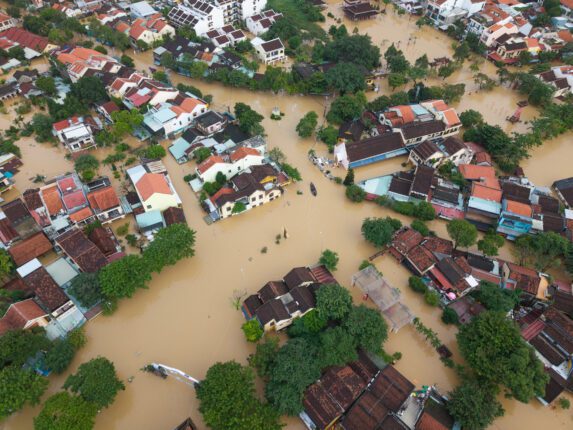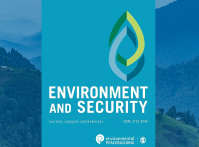-
Shall We Ask ChatGPT About Water During Negotiation?
November 17, 2025 By Kyungmee KimArtificial Intelligence (AI) has the potential to reshape how data and knowledge are produced, shared, and used in transboundary water negotiations, but it also risks entrenching political imbalances, deepening mistrust, and displacing the need for genuine cooperation.
This is the central finding from a study I conducted with Abeer S. Ahmad, based on interviews with 16 water diplomacy experts. As AI systems are increasingly deployed in hydrological monitoring and water management, the promise of politically “neutral” data is alluring—but it may also be misleading. The experts expressed both optimism and caution. While AI might help fill data gaps and inform decision-making, it could also amplify inequality, bias, and disinformation.
The stakes are high. In many transboundary river basins, the availability of reliable and timely data on water flow, usage, and infrastructure is already contested. Determining how much water is available, when and where, underpins both disputes and claims. Without mutually agreed baselines, parties struggle to establish equitable water-sharing agreements.
AI Could Make Water Diplomacy More Neutral
A recurring theme in the expert interviews was the belief that AI systems, particularly when paired with satellite imaging and remote sensing, could help depoliticize water negotiations. These technologies can generate independent, cross-border hydrological data even in situations where one country refuses to share information.
Some experts viewed this as an opportunity to overcome political deadlock. For example, AI-driven flood forecasting is currently helping the Vietnamese government prepare for transboundary floods in the Red River, despite limited data-sharing cooperation from upstream China. Similarly, machine learning models are increasingly used to assess dam impacts and predict water flow under various climate scenarios. These tools raise hopes for more credible, comprehensive, and neutral datasets that can support cooperative water management.
But “Neutral” Doesn’t Mean Apolitical
Despite the optimism, most experts also raised serious concerns. While AI may appear neutral, the data it uses and the algorithms it runs on are not free from political, economic, or cultural bias. AI systems rely on historical data, models, and assumptions that may reproduce existing inequalities or omit the perspectives of marginalized groups.
Moreover, the use of AI can introduce a false sense of certainty. Sophisticated modeling tools might mask the underlying uncertainties of future water availability, especially under changing climate conditions. Experts warned that this could embolden certain actors to present AI-generated data as objective truth, potentially undermining negotiation processes rather than supporting them.
The risk of data manipulation and interest-driven research is another concern. If parties perceive AI tools as being skewed or used for diplomatic advantage, this can further erode trust, particularly when there’s already disagreement on baseline data.
AI Could Undermine the Need for Cooperation
A particularly provocative insight from the study was the suggestion that AI might reduce incentives for cooperation. If downstream countries can access satellite-derived data independently, they may feel less need to engage upstream counterparts in data-sharing agreements. But without such agreements built on dialogue, trust, and shared understandings disputes are unlikely to be resolved.
This could create a dynamic where powerful actors impose their own models and data, leaving less technologically advanced states at a disadvantage. Rather than leveling the playing field, AI could deepen divides and harden positions.
The risk here is not just technical—it is deeply political. AI could enable one-sided interpretations of reality, where hydrological data becomes another site of struggle over competing narratives, justifications, and claims.
Co-Creation and Interactive Knowledge Still Matter
One area where experts saw genuine promise was in AI’s potential to support interactive and co-created knowledge processes. Digital diplomacy—such as online negotiation forums, translation tools, or AI-facilitated dialogue—gained traction during the COVID-19 pandemic and continues to evolve.
AI could enhance these processes by enabling real-time data sharing, collaborative modeling, or scenario planning. These tools, when used transparently and inclusively, can help build a sense of shared understanding and interdependence, both essential for sustainable cooperation over water.
But AI cannot replace the social and political work of diplomacy. As one expert emphasized, “AI can support, but not substitute, state-sanctioned exchange and trust-building.”
The Shadow of Generative AI and Disinformation
The rise of generative AI adds a new layer of complexity. While generative models like ChatGPT may offer rapid summaries, recommendations, or scenario outputs, they also carry the risk of hallucinating facts or reinforcing misinformation. In a negotiation setting, relying on such tools could be risky, especially if outputs are not verified against established sources.
Experts voiced concern over the potential for disinformation campaigns, not new, but more potent when amplified by generative AI and social media. The ability to manipulate public opinion or diplomatic narratives through AI-generated content adds urgency to the need for oversight, transparency, and accountability in the deployment of these tools.
Reimagining AI’s Role in Water Diplomacy
AI’s growing presence in water diplomacy is not inherently good or bad, but context-dependent. Its role in knowledge production touches on fundamental issues of power, politics, and legitimacy. Who gets to decide what counts as valid knowledge? Whose interests are embedded in the models we use? And how can technology be harnessed to promote, not replace, cooperation?
The knowledge we use in water negotiations is not just technical; it is social and political. Hydrological models are shaped not only by data but by the values and assumptions of those who build and use them. This understanding must guide the development and integration of AI tools in water diplomacy.
As experts in our study emphasized, AI should be seen as one tool among many, useful, perhaps, but not a silver bullet. It should enhance, not displace, human-led diplomatic processes. And it should be deployed with care, reflection, and ongoing dialogue among all stakeholders.
Kyungmee Kim is an Associate Senior Lecturer at the Swedish Defence University. Her current research focuses on the intersection of climate change and insecurity, as well as environmental human rights defenders.
Sources: Ambio; Critical Physical Geography; Delft Institute; ensia; Geoforum; Global Environmental Change; npj Climate Action; Stockholm International Peace Research Institute; United Nations; Water Alternatives; Water International; Water Policy; Water Resources Management; World Meteorological Organization.
Photo Credits: Licensed by Adobe Stock.
 A Publication of the Stimson Center.
A Publication of the Stimson Center.









